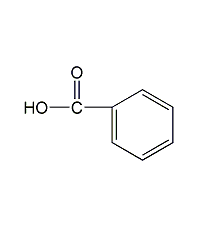
Structural formula
| Business number | 01DZ |
|---|---|
| Molecular formula | C7H6O2 |
| Molecular weight | 122.12 |
| label |
benzene formic acid, benzoic acid, Dracylic acid, Benzenecarboxylic acid, Phenylformic acid, preservative food, product additives, synthetic fragrances, daily necessities, spices and essences, preservative, antiseptic pesticides, Feed additives, feed storage additives, acidic solvent |
Numbering system
CAS number:65-85-0
MDL number:MFCD00002398
EINECS number:200-838-9
RTECS number:DG0875000
BRN number:636131
PubChem number:24854555
Physical property data
1. Character: white monoclinic flake or needle crystal. Lightweight. Odorless or slightly odor similar to benzoin or benzaldehyde. Can evaporate with water vapor. Sublimation begins at about 100°C.
2. Relative density (25℃, 4℃): 1.0749130
3. Relative density (20℃, 4℃): 1.265915
4. Melting point (ºC): 122.4
5. Boiling point (ºC, normal pressure): 249.4
6. Refraction at room temperature Index (n25): 1.504132
7. Refractive index: 1.53974
8. Flash point (ºC): 121-131
9. Solubility parameter (J·cm-3)0.5:22.432
10. van der Waals area (cm2·mol-1): 9.274×109
11. van der Waals volume ( cm3·mol-1): 65.370
12. Gas phase standard combustion heat (enthalpy) (kJ·mol-1): -3322.0
13. Gas phase standard claims heat (enthalpy) (kJ·mol-1): -290.1
14. Gas phase standard Entropy (J·mol-1·K-1): 369.10
15. Gas phase standard free energy of formation (kJ·mol– 1): -210.3
16. Gas phase standard hot melt (J·mol-1·K-1): 103.47
17. Liquid phase standard combustion heat (enthalpy) (kJ·mol-1): -1273.1
18. Liquid phase standard claimed heat (enthalpy) (kJ·mol-1): -193.3
19. Solubility: 1g product is dissolved in 2.3ml cold ethanol, 1.5ml boiling ethanol, 4.5ml chloroform, 3ml ether, 3ml acetone, 30ml carbon tetrachloride, 10ml benzene, 30ml carbon disulfide, 23ml turpentine. Soluble in oilsternal/day_101008/201010080914218297.gif” alt=”” />
3.The crude product can be obtained by oxidation of benzyl chloride, washed with cold water, and then Recrystallize in hot water.

4.Use hydrolysis method and hydrogenation method. Hydrolysis method: use phthalic anhydride as raw material, obtained by hydrolysis and decarboxylation. Chlorination method: use Toluene is used as raw material and is obtained by chlorination and hydrolysis.
5. Tobacco: pOR, 18, 26, 41, 43, 44; FC, 9, 18, 40, 59; BU, 26, 56.
Purpose
1. Alkali quantitative standard. Iodine quantitative standard. Calorific value standard. Determination of aluminum, boron, cerium, copper, iron, lead, manganese, mercury, nickel, nitrate, nitrite, silver, titanium, tungsten and vanadium. Determination of aluminum, copper, iron, titanium and uranium. Standard for the determination of carbon, hydrogen, oxygen and relative molecular mass in organic trace analysis. Also used in benzoylation in organic analysis. preservative. 2. It can be used as a non-aqueous catalyst for the prereaction of tert-butyl phenolic resin and magnesium oxide. It is also an important raw material for organic synthesis and is used to prepare various benzoate esters and metal salts. It is used as a preservative and bactericide in the food and cosmetics industries. It can also be used as a modifier for alkyd resin coatings and polyamide resins. Polystyrene curing accelerator, polyester polymerization initiator, metal rust inhibitor, dye carrier for dyes. It can also be used to make spices, plasticizers, etc. 3.Reagent for detecting manganese, mercury, nickel, magnesium, titanium, tungsten, uranium, nitrate, and nitrite. Used for the separation of trivalent and tetravalent ions (such as iron, aluminum,
chromium, etc.). 4.Used as analytical reagents, such as organic element analysis, standard for determination of alkali and iodine by titration method, and reference material for determination of calorific value. Also used as a preservative. 5.Preservatives, antimicrobials, fragrances. Benzoic acid and its sodium salt are important preservatives in food. It has an inhibitory effect on yeast and mold under acidic conditions. The antibacterial effect is strongest when the pH value is 3, while the effect on many molds is poor when the pH value is 6, so its optimal antibacterial pH value is 2.5 to 4.0. Benzoic acid is widely used in pharmaceutical and dye intermediates and in the manufacture of plasticizers and fragrances. 6.Benzoic acid and its salts are used in chemical polishing solutions and as additives in some plating solutions (such as galvanizing, etc.). 7 Used as an anti-rust agent for steel equipment and a corrosion inhibitor for detergents. It is widely used as a preservative in cosmetics, spices and food. 8. It is used as a flavoring agent in daily flavors and plays a preservative role in food flavors. It is often used in chocolate, lemon, orange and cherry food flavors. It is also commonly used in tobacco flavors.

 微信扫一扫打赏
微信扫一扫打赏

